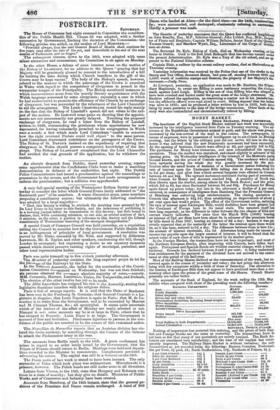POSTSCRIPT.
SATURDAY.
The House of Commons last night resumed in Committee the considera- tion of the Public Health Bill. Clause 3d was adopted, with a further concession by Government, limiting the duration of the Commission: the following proviso was added, on the motion of Lord MOR.PRTH.— " Provided always, that the said General Board of Health shall continue for five 7ears next after the date of the act, and thenceforth to the end of the next session of Parliament, and no longer."
The subsequent clauses, down to the 56th, were adopted with some Minor alterations and concessions; the Committee to sit again on Monday.
In the other House, a debate of some interest arose on the motion of the Bishop of LLANDAFF, for an address to the Queen " praying that her Majesty will be graciously pleased to consent to the introduction of a bill for limiting the time during which Church benefices in the gift of the Crown may be kept vacant." The body of the Bishop's speech, however, related to the manner in which the patronage of the Crown is exercised in Wales with regard to the competency of clergymen to preach in the Vernacular tongue of the Principality. The Bishop mentioned instances in which inconvenience arose from the merely literary acquaintance with the Welsh language possessed by some clergymen; especially a case in which he had endeavoured to promote the efficiency of the Church by an exchange of clergymen, but was prevented by the reluctance of the Lord Chancellor to aid the arrangement. The LORD CHANCELLOR rested his reply mainly on the fact that the Bishop of Llandaff's speech did not relate to the sub- ject of the motion. He bestowed some pains on showing that the appoint- ments are not unnecessarily nor greatly delayed. Touching the proposed exchange of clergymen, he read a letter from the Bishop of Landaff, written in 1838, commending the gentleman whose appointment he now deprecated, for having voluntarily preached to his congregation in Welsh ewe a month; a fact which made Lord Cottenham " unable to conceive how the right reverend Prelate could well object " to the same person. Lord Cottenham deprecated restrictions on the prerogative of the Crown. The Bishop of St. DAVID'S insisted on the expediency of requiring that Clergymen in Wales should possess a competent knowledge of the lan- guage. The Bishop of LLANDAFF complained that the Lord Chancellor bad avoided the real grounds of the application; but he withdrew the motion.






















 Previous page
Previous page